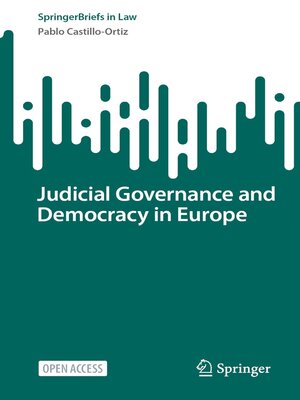
Sign up to save your library
With an OverDrive account, you can save your favorite libraries for at-a-glance information about availability. Find out more about OverDrive accounts.
Find this title in Libby, the library reading app by OverDrive.



Search for a digital library with this title
Title found at these libraries:
| Library Name | Distance |
|---|---|
| Loading... |
This is an Open Access book.
Amid the growing debate about models of judicial governance and their relationship to democratic quality, this book offers a systematic and empirical study of this relationship. The book thereby contributes to filling in this gap for the European continent. Taking an interdisciplinary politics and law perspective, and combining empirical and theoretical considerations, the book addresses the important link between democracy and judicial governance. In particular, it provides for three interconnected contributions. First, the book provides for a comprehensive classification of European countries into different models of judicial governance. Second, the book analyses empirically the relationship between the design of judicial governance and the quality of democracy. Third, building on those findings, the book presents policy reflections for the reform and improvement of mechanisms for judicial governance in European countries.
The book seeks to refine our knowledge about the relationship between judicial governance and democracy, making an important academic and social contribution. In an era in which many democracies backslide and deconsolidate, it assesses to what extent existing mechanisms for judicial governance have contributed to the stability and quality of democratic systems in which they are implemented. Furthermore, the book puts forward reflections to improve the role of organs for judicial governance in fostering the quality of democracy.
Since the book introduces in an accessible form key concepts of Judicial Governance, it will be of interest for the general public as well as academics and students in the fields of Law and Political Science. The book also addresses policy makers, as based on our empirical knowledge about the interaction judicial governance and democracy it puts forward ideas for a design of judicial governance that is more capable of protecting democratic systems of government.







